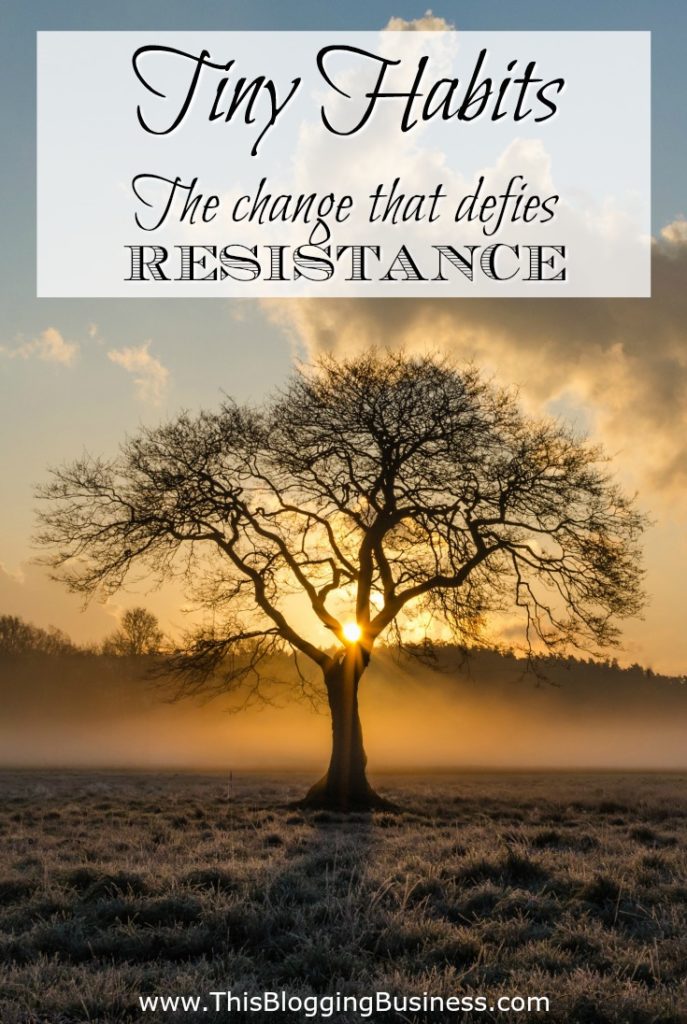

One of Fortune’s “10 New Gurus You Should Know,” Fogg lives in Northern California and Maui. You can join here: įor the fastest way to bring Tiny Habits into your life (no book purchase required!), go to this site and design new habits right now:
#3 tiny habits free
He began offering his free 5-day Tiny Habits program in 2011. What you'll find in Tiny Habits is a combination of Fogg's academic research combined with his hands-on experience personally coaching over 40,000 people in the Tiny Habits method. His book Tiny Habits is a New York Times Bestseller, and the editors at Amazon also selected this as the #1 book of 2020 in "Leadership and Business."
#3 tiny habits professional
His favorite professional training is the "Behavior Design Boot Camp," which he teaches once a month.
#3 tiny habits how to
In addition to his research on human behavior, Fogg teaches industry innovators how to create successful products. BJ Fogg, PhD, is the founder and director of the Behavior Design Lab at Stanford University, where he has directed lab research for over 20 years. Like this story? Like CNBC Make It on Facebook. After I walk in the door at home, I will hang my keys on the hook. After I leave the office, I will think about one success from the day.ġ2. I will review it in detail and get back in touch soon."ġ1. After I read an e-mail that's time-sensitive, I will reply with this script: "Got it. After I read an e-mail I can't deal with immediately, I will mark it as unread.ġ0. After I read an important e-mail, I will file it in a folder for the designated project.ĩ. What haven't we covered yet that's important?"Ĩ. After I notice a call going on for longer than expected, I'll say this: "It's been great to talk, but I need to wrap up. After I sit down at a meeting, I will write the title, the date, and the attendees at the top of my notes.ħ. After I find myself mindlessly browsing social media, I will log out.Ħ. After I launch a new Word doc, I will hide all other programs running on my computer.ĥ. After I finish reading e-mail, I will close the e-mail browser tab.Ĥ. After I close my office door, I will organize one item that's lying around.ģ. After I sit down at my desk, I will put my phone on do not disturb mode.Ģ. Each habit is connected with an anchor or prompt to help you remember to complete it.ġ. "Tiny will grow bigger, just like a seed grows into a tree." 12 tiny habits that help people with productivity, according to Fogg's researchįogg suggests saying these habits to yourself throughout the day. "When you go tiny, you don't need to rely on willpower or motivation,' Fogg writes. That's because by doing small habits, you'll "be less fearful to try to attempt other changes." When the habit takes hold, it will have a ripple effect and eventually boost your productivity, he says. Productivity beats the desire for habits that have to do with being financially secure and losing weight.Ī good small habit for productivity, says Fogg, is putting your phone on do not disturb mode as soon as you sit down at your desk. The habits people want to make part of their routine the most are around productivity, according to a recent study conducted by Fogg's team. By congratulating yourself after completing the habit, you will be more likely to repeat it, according to Fogg's research.įogg says you'll eventually "do more of the habits in time that you hadn't planned and you'll also be less fearful to try to attempt other changes." Lastly, to make something stick permanently, it's important to celebrate after completing the habit. Your existing routine can serve a prompt in a powerful and elegant way," Fogg says.

It's also safe to experiment with because if you don't succeed, the "misstep is tiny."Īdditionally, he thinks it crucial to start a new behavior following something that is already a staple in your routine (like brushing your teeth). And there's no need to create an elaborate plan or rally social support. By taking tiny steps to start, Fogg found that people are more likely to keep that habit because the new behaviors don't require a lot of motivation at first. For instance, if you have a goal of drinking a gallon of water a day, the key is to start with having a sip after you wake up in the morning, says Fogg. Fogg says he found that most people aim too high and big when trying to form a new habit - which often leads to them to fail.


 0 kommentar(er)
0 kommentar(er)
